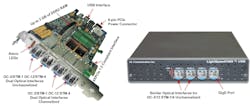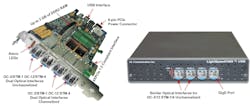High-speed OC-3/12 and STM-1/4 test platforms for channelized and unchannelized applications
GAITHERSBURG, MD—GL Communications, a global provider of telecom test and measurement solutions, has announced its insight into the High Speed OC3/12 and STM1/4 Analysis and Emulation Platform referred to as LightSpeed1000. GL's LightSpeed1000 hardware platform (PCIe Card and USB Pod) is capable of OC-3/12 and STM-1/4 wire-speed processing on optical ports for functions such as BERT, Recording, Playback, Monitoring of Channelized, and UnChannelized applications, such as Asynchronous Transfer Mode (ATM), Packet over SONET (PoS), and Channelized Applications for embedded T3s, E3s, T1s, and E1s.
Speaking to the press, GL Communications CEO Vijay Kulkarni CEO, “GL's LightSpeed1000 comes with all the necessary software for capturing, monitoring, emulation, and analysis of protocols over SONET-SDH links, with a price tag that compares very favorably with similar test instruments at three times the price. LightSpeed1000—with optical ports—supports Channelized SONET and SDH mapping of T1/E1 framed signals. In this mode, LightSpeed1000 supports direct access to all 336 T1s (or 252 E1s) channels on an OC-12/STM-4 line per port for analysis and simulation—all within a single PC. The main advantage is that any of the T1/E1 or DS0 test requirements can be met without resorting to electrical access.”
“The card's multiple connectivity using PCIe, Gigabit Ethernet (GigE), and USB makes it suitable for many applications. The hardware is firmware FPGA based making it easy to upgrade in the field for application versatility.”He further added, “A unique feature of the card is the capability to capture, transmit and process at wirespeed to/from applications and hard disk on all interfaces. An API Toolkit allows users to develop specialized applications.”GL Communications has the following variants of OC-3/STM-1 and OC-12/STM-4 Analyzers:
- Quad OC-3/STM-1 and OC-12/STM-4 PCI-Express card (Windows®10, 64-bit is Supported)Two ports out of the 4 ports are meant for SONET/SDH UnChannelized data. The remaining two ports are meant for SONET/SDH channelized data carrying many independent unframed/framed T1, E1, T3, and E3 streams.
- Portable OC-3/STM-1 and OC-12/STM-4 Unit (Windows 10, 64-bit is Supported)The pod consists of 4 optical ports out of which the first two ports are Unchannelized and the last port is used for Gigabit Ethernet (GigE).
Important Features
- Allows to configure the number of T1 E1 channels to be Multiplexed or Demultiplexed to /from OC-3/12 STM-1/4
- 2 Channelized OC-3 STM-1/OC-12 STM-4 SONET/SDH interfaces per Lightspeed1000 card
- 2 Unchannelized OC-3 STM-1/OC-12 STM-4 interfaces per Lightspeed1000 card
- Channelized ports act as terminal multiplexers and demultiplexers
- Allows direct access to anything and everything on SONET/SDH - Framing and Payload, including structured traffic (DS0, T1, E1, STS-1, DS3 etc) or unstructured traffic (ATM, PoS, etc)
- Scans the received STM-4/STM-1 traffic and identifies the mapping, tributary type (T1/E1), equipped/unequipped status of the tributaries
- Broadcasts the selected T1/E1 channel data on all the 252 E1's or 336 T1's
- Supports any combination of DS0/64/56/16/8 kbps fractional T1/E1, and N x T1/E1 interface definitions (a total of 252 E1s or 336 T1s – in each port)
- Pluggable SFPs allow Single-mode (SM), and Multi-mode (MM) fibre optic non-intrusive tap
- API for Microsoft Windows and Linux operating Systems to develop user specific applications
- Key T1 E1 specific features -
- Comprehensive protocol analysis and emulation - HDLC, SS7, ISDN, CAS, PPP, Frame Relay, ATM and more
- Analysis of DS0s for frequency, power level, spectral display, listen to channel
- GL's proven WCS high level remote interface
- All protocols analyzers can be used with GL's NetSurveyorWeb
GL Communications Inc, is a global provider of test and measurement solutions and has over the years worked with major telecom equipment vendors, service providers, and system integrators to meet the testing requirements arising at various stages of telecom products development life cycle.

